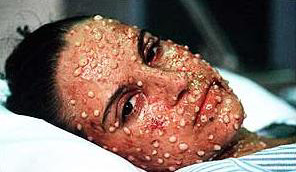Today, April 25th Is World Malaria Day
It is very ironic that today's biggest news story is about the possible outbreak of a pandemic swine flu.
The basic difference in the philosophy of the current leadership of the Democratic and Republican Parties illustrate how political philosophy can have a dramatic effect on infectious disease. You only have to look at the eradication of small pox and the change in strategy of combating Malaria to see how this plays out in the long term.
"Government Doesn't Work, Government is the problem not the solution".
Whenever I hear these infantile remarks I simply respond "Government eradicated small pox" 

The greatest achievement of mankind, IMHO, was not reaching the moon but eradicating small pox. It required not simply scientific and technical achievement but it also required social organization. While significant reductions could be made in small pox in some countries, without a multilateral effort in the community of nations it would continue to remain in the human community and a threat to all humanity even though it continued to effect small numbers. As long as it remained active in the human transmission pool there was always a chance that it could mutate and come back in a resistant form.
Small pox was one of the largest killers in the 20th century. It is estimated that it killed as many as 500 million people. In the 1950s it was estimated that it killed 50 million in the 1950s. It is estimated that in 1967 15 million people contracted the disease. Twelve years later it was gone. Government and the dreaded United Nations eliminated it in 12 short years.
It is a story of courage and cooperation. It is a story of American leadership embracing a world wide challenge and getting every single country to sign on. It could only work if it was all or nothing. We needed the cooperation of the Soviet Union and Communist China.
Ironically the sphere of small pox was reduced until it was isolated in a small area in the Horn of Africa, Somalia. International cooperation led to cooperation and its elimination there, and the end of the disease.
The Story that isn't taught
It is a great story, a Shindler's list type of story. There should have been movies and books about it and it should have been in every history text book in every school in this country.
It isn't.
Small Pox remains the only human infectious disease that has been completely eradicated. You can read about it here:
http://en.wikipedia.org/wiki/SmallpoxOne of the reasons that no one hears about it now is that it is no longer in our economy. This year the governments in the world will spend exactly nothing on small pox (except for the United States and Russia who keep armed guards around the two remaining vials kept in secured labs). It is a story of how cooperative 'socialized' efforts will mean an initial expenditure but that the long term savings are huge. Today we have no loss of life, or expensive treatments for the millions of people who should be suffering from this disease.
Small pox was the most prevalent scourge of mankind for 12,000 years. Today it is gone because of government and international agency action. Scientists, political leaders and health providers working together.
Confronting the Reagan/Bush Legacy
Once the political leadership of the United States lowers the bar on human achievement, it is difficult to sustain the type of world focus and cooperation needed to achieve anything great.
Twenty years of 'Government is the problem' and 'No we can't' has an impact, even on scientists and public health institutions.
One of the remaining most insidious infectious diseases afflicting humankind is Malaria. It is estimated that 300 million people are afflicted with Malaria every year and 3 million die while the vast majority face recurrence through out their life.
In that context we note the following article from CNN that was printed on World Malaria Day, April 24th.
CNN Commentary: Yes, we can eradicate malaria
http://www.cnn.com/2009/HEALTH/conditions/04/25/fauci.malaria/ (CNN) --
For the past few decades when talking about malaria, public health officials and malaria experts have avoided the word "eradication." This reluctance is based in part on relatively recent history. In 1955, the World Health Organization (WHO) launched a valiant effort to eradicate malaria throughout the world.
Although the disease was virtually eliminated in many temperate regions and reduced in some tropical areas, the goal of worldwide eradication fell short, and the effort ultimately was abandoned. Today, malaria has resurged with a vengeance. Half the world's population is at risk of malaria infection. Approximately 250 million people get sick with malaria each year and nearly a million individuals die -- mostly young children and pregnant women in sub-Saharan Africa.
So when Bill and Melinda Gates dared to resurrect the "E" word in 2007, many in the public health community were skeptical and said in private conversation, "It can't be done." . . .
Finally, perhaps our greatest challenge is sustaining our research efforts until the ultimate eradication of malaria. We may run the risk of becoming victims of our own success. Once we find ways to reduce the disease burden and deaths due to malaria, the world may no longer perceive malaria as a major threat and may lose interest.
Celebrities, politicians and even health officials may focus their attention on other maladies that pose a more immediate threat. We cannot allow this to happen. Unless we want to face the persistence and even resurgence of malaria in the next century and beyond, we must maintain our resolve to fully eradicate this deadly scourge across the globe. It can be done.
Editor's note: Anthony S. Fauci, M.D., is director of the National Institute of Allergy and Infectious Diseases at the National Institutes of Health. Fauci has overseen research into preventing, diagnosing and treating disease and has made numerous discoveries related to HIV/AIDS. He has received the National Medal of Science, the Mary Woodard Lasker Award for Public Service and the Presidential Medal of Freedom. April 25, 2009, is World Malaria Day.

Dr. Anthony Fauci says we should aim to eradicate the killer disease of malaria.
What the Bill and Malinda Gates foundation is attempting to achieve is almost biblical in nature. Malaria has been the largest single factor in 'selective pressure' on human gene pool as Malaria has had its way for 50,000 years.
Even with the foundation's assistance it can only be achieved with an active strong American leadership that uses our best scientists and bests diplomats working together.
This cannot be achieved in a divided world. No one would seriously suggest that it could ever be achieved under the Reagan/Bush/Cheney era. What would they do with a government that wouldn't help - bomb them?
You can't bomb Malaria away.
So after these decades of pessimism now scientists believe that in 5 years the world could eradicate Malaria.
Can malaria deaths be eradicated by 2015?
http://www.cnn.com/2009/HEALTH/04/23/world.malaria.day/ Last year on April 25, the World Malaria Day initiative was launched to raise awareness of the disease and efforts to control malaria around the world, as part of the Roll Back Malaria partnership -- a global group of non-governmental organizations (NGOs) and governments.
The groups behind the initiative set ambitious goals to ensure universal access to malaria medication and treated mosquito nets in Africa by the end of 2010.
They also announced plans to attain near zero malaria-related deaths by 2015.
Beyond the headline stories of the War, Economy, Torture and so on are other stories that require political leadership that also have an impact on tens of millions. This story can only be achieved with an American administration that is actively engaged, supporting science and diplomacy, and embracing multilateralism. In 5 years from now the Bush administration will be receding, a distant memory, and hopefully it will be taking Malaria and the negative pessimism about what great things our government can achieve with it. Ironically it will also save us money.